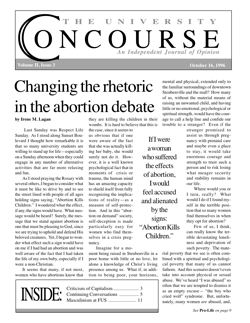Disappointed with the Concourse
by Steven J. Brust
I am writing to express my disappointment with a recent issue of the University Concourse. In past issues, you have stated that your goal is to pursue truth and stimulate intellectual debate at Franciscan University. Unfortunately, in reading the two lead articles of your September 18 issue, it appears that you are straying from your purpose: the articles are less of informed intellectual argument and more of emotional and unreflective reaction.
In your article on polygamy, you seem to make sweeping generalizations based upon one discussion which you “heard took place.” From this one instance, you immediately claim that “there evidently still exist any number of serious Catholic intellectuals (my guess is they are all men),” who would advocate polygamy. Just how do you know, from one discussion, that there are all these men out there arguing for polygamy? It is quite a leap. I have never, nor has anyone else that I have spoken to, heard of anyone arguing for polygamy based upon St. Thomas’ precepts of the natural moral law. If you didn’t want to let the remarks of these students pass without comment, you ought to have addressed yourself to those who made them, not to the entire readership of the Concourse.
This leads me to my second concern, which is that I would think you owed it to your readers to at least research into what Saint Thomas says on this subject. Your self-proclaimed ignorance in this area lessens your credibility in arguing against “these men,” and gives the impression that instead of intellectual research, you prefer supposition. Perhaps a bit more research on the natural moral law might have helped you to refute those in the discussion.
I also have some concerns with Miss Bratten’s article regarding sports. First, although there are quite many abuses of the athletic scholarship system, I do not believe it tends to render the scholarships themselves invalid—which she seems to imply. In fact, there are many financially disadvantaged student athletes with decent grades who would not be able to attend institutions of higher education if it were not for the use of their God-given athletic talent.
Second, in regard to her specific experience with the Honors symposium, the conflict she describes does not indicate that “something is rotten” in Steubenville, but rather that there is a mere scheduling conflict between two goods. It is well known that the intramural sports events are scheduled for set times at the beginning of the season. Thus, if there are students involved with both sports and the Honors Symposium, why not schedule the symposium meetings so that they do not conflict with previously scheduled games? It seems that Ms. Bratten wants to jump to a general conclusion based upon her experience. But if someone chooses a Frisbee game “over” an Honors symposium meeting, it does not necessarily mean he is selling out to the sports-god.
The point to be grasped in this letter is that these two articles do not encourage serious intellectual debate among students. Instead, they have the effect of decreasing the respect people have for your journal as a serious intellectual forum, and of questioning whether your motives are more emotional than intellectual. I am sure many would agree that you have done and can do much better. I pray and hope you will continue in your noble efforts and more consistently fulfill the stated purpose of your journal.
Steven J. Brust, M.A. Philosophy


